Introduction
- The idea of sustainability: managers are expected to integrate environmental practices into operations management (Gustafsson, Hermelin & Smas 2019; Hooker, Denslow & Giunipero 2016).
- Managers’ goal: to decrease a negative impact on the environment and guarantee environmentally friendly activities (Longoni & Cagliano 2015).
- Problem Statement: Trying to integrate environmental policies into operations management, managers can face a range of challenges and obstacles, but only limited research on these barriers is available (Kannan & Latan 2016; Magon et al. 2018).
- RQ1: What are the challenges associated with integrating environmental issues and policies into operations management?
- RQ2: Is there a significant relationship between challenges in implementing environmental policies and their integration into operations management?
My name is XXX. I wish to compile the research paper on the topic of challenges in integrating environmental issues into operations management because this subject is critical for organisations today. The current focus on addressing environmental issues in companies is associated with the development of the idea of sustainability, and managers are expected to pay more attention to integrating environmental practices into operations management (Gustafsson, Hermelin & Smas 2019; Hooker, Denslow & Giunipero 2016). Managers’ main goal is to organise operations in a specific way to decrease a negative impact on the environment and guarantee that all the activities are environmentally friendly (Longoni & Cagliano 2015).
The problem is that, trying to integrate environmental policies into operations management, managers can face a range of challenges and obstacles, but only limited research on these barriers is available (Kannan & Latan 2016; Magon et al. 2018).
Research questions to answer and address the stated research problem can be formulated:
RQ1: What are the challenges associated with integrating environmental issues and policies into operations management?
RQ2: Is there a significant relationship between challenges in implementing environmental policies and their integration into operations management?
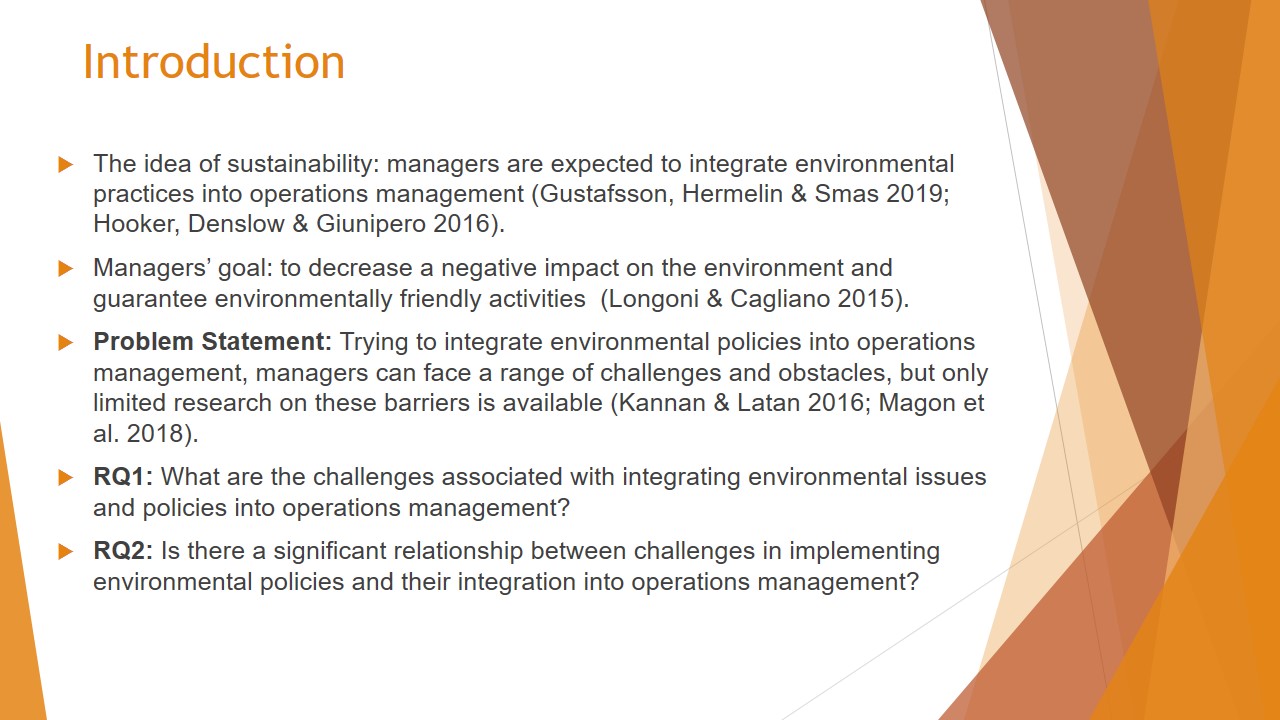
High-Level Reason for Selecting the Topic
- The topic has practical significance, but little research is available in the literature.
- Environmental issues in operations should be taken into account to achieve sustainable development.
- Limited information on possible obstacles to influence managers’ activities (Yang & Zhang 2017).
- Pollution and extensive energy consumption can be regarded (Tseng et al. 2019).
- Efficient environment-oriented performance programs should be implemented in operations management (Panigrahi & Rao 2018).
- Barriers and challenges preventing managers from making operations more sustainable need to be identified.
I am interested in studying the topic of possible challenges associated with integrating environmental issues into operations management because it has practical significance, but little research is available in the literature. To address the requirements of sustainable development, environmental issues in operations should be taken into account, but there is still a lack of information on possible obstacles to influence managers’ activities on this path (Yang & Zhang 2017). Different operations are usually associated with different environmental issues, such as pollution and extensive energy consumption, for example (Tseng et al. 2019). Thus, managers should implement efficient environment-oriented performance programs, but this process is challenging when it is necessary to integrate these programs in operations management (Panigrahi & Rao 2018). What barriers can prevent managers and other employees from making operations more sustainable is a critical question to address.
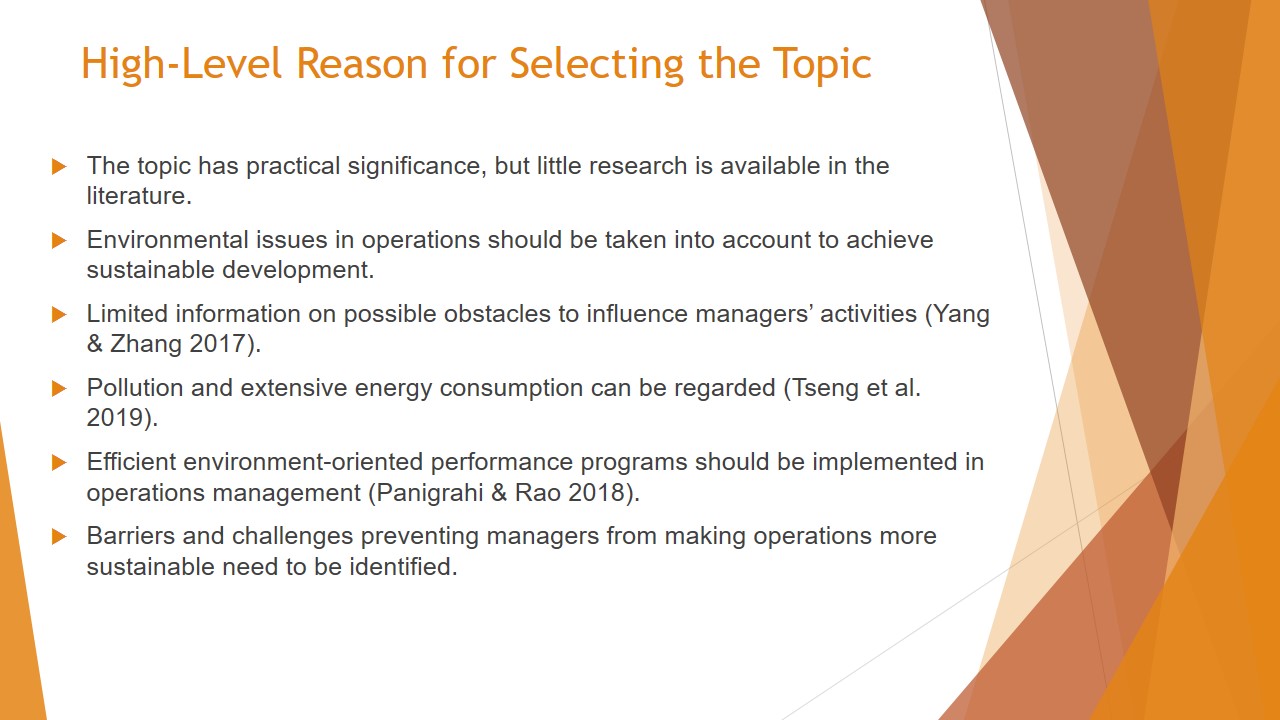
Results to Achieve
- Challenges in implementing environmental policies can significantly influence their integration into operations management (Ghazilla et al. 2015; Ullah 2017).
- The determination of a particular extent is important.
- Typical challenges associated with integrating environmental policies into operations that are faced by managers and other employees to be identified.
- Outcome: managers will develop strategies to mitigate challenges and improve integration.
- The extent to which challenges can influence managers’ success in making operations management environmentally friendly will be determined to adjust strategies accordingly.
Previous studies on the topic suggest that challenges in implementing environmental policies can significantly influence their integration into operations management (Ghazilla et al. 2015; Ullah 2017). That is why, the determination of a particular extent is important. Conducting this research, I will identify typical challenges associated with integrating environmental policies into operations that are faced by managers and other employees. As a result, managers will be able to develop strategies to mitigate these challenges and guarantee effective integration. Furthermore, I will determine to what extent these challenges can influence managers’ and employees’ success in making operations management environmentally friendly, and strategies will be adjusted accordingly to minimise negative effects of identified barriers.
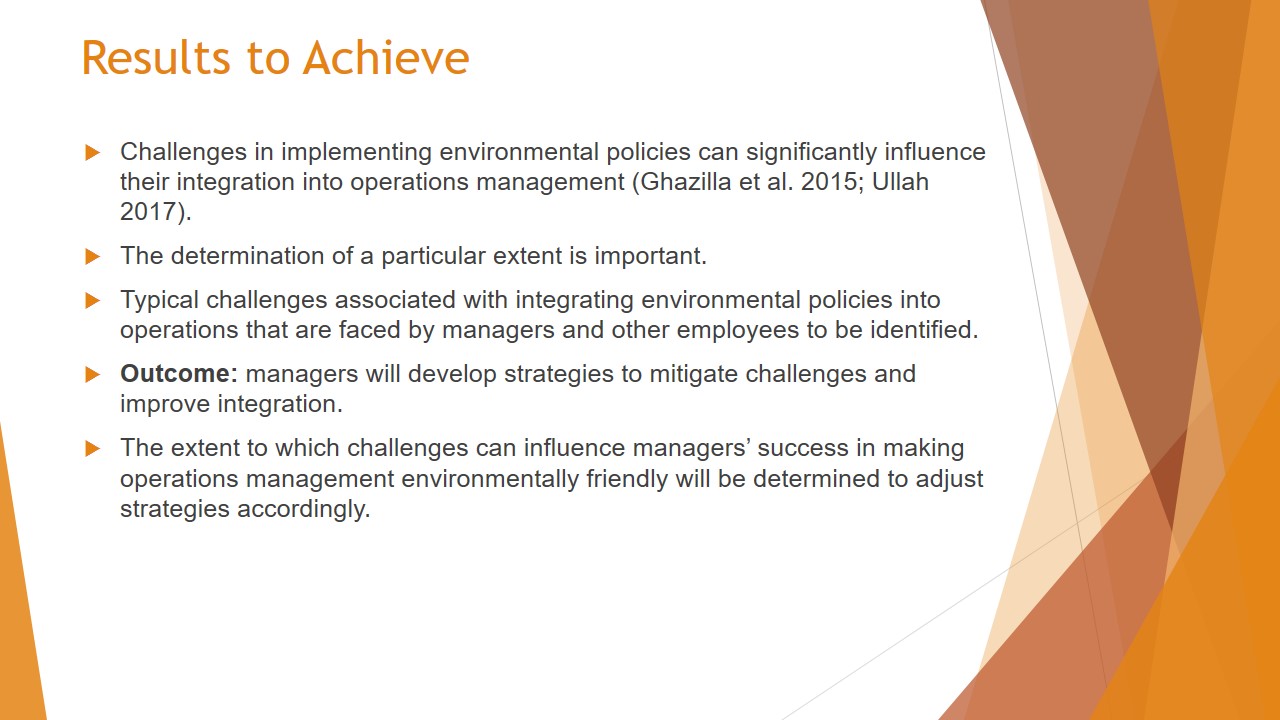
Methodology
- Qualitative → Literature Review and RQ → Purposive Sampling, 8 Participants → Probing Questions → Focus Group → Thematic Analysis of Data → Interpretation of Findings → Conclusions.
- Quantitative → Literature Review and RQ → Purposive Sampling, 8 Participants → Survey Development → Data Collection → Chi-Square Tests → Discussion of Findings → Conclusions.
To address two research questions formulated based on reviewed literature and study purposes, I will use the combination of qualitative and quantitative methodologies – the mixed methods research. A quantitative correlational design will be applied (Karlsson 2016). I will organise the collection and analysis of data simultaneously. I decided to use the non-probability purposive sampling technique to recruit eight managers working in the field of operations management in different organisations who have experience in integrating environmental issues in their practice as study participants. I will organise original data collection with the help of focus groups to gather qualitative subjective data on experienced challenges and using surveys to gather quantitative data on the possible relationship between challenges and policies integration into operations management (Choi, Cheng & Zhao 2016). Thematic analysis of data will be used to identify themes and challenges in participants’ narratives, and Chi-square tests will be used to determine the relationship between such categorical variables as challenges and integration of policies. I will interpret qualitative data and discuss quantitative data to make conclusions and address the research questions.
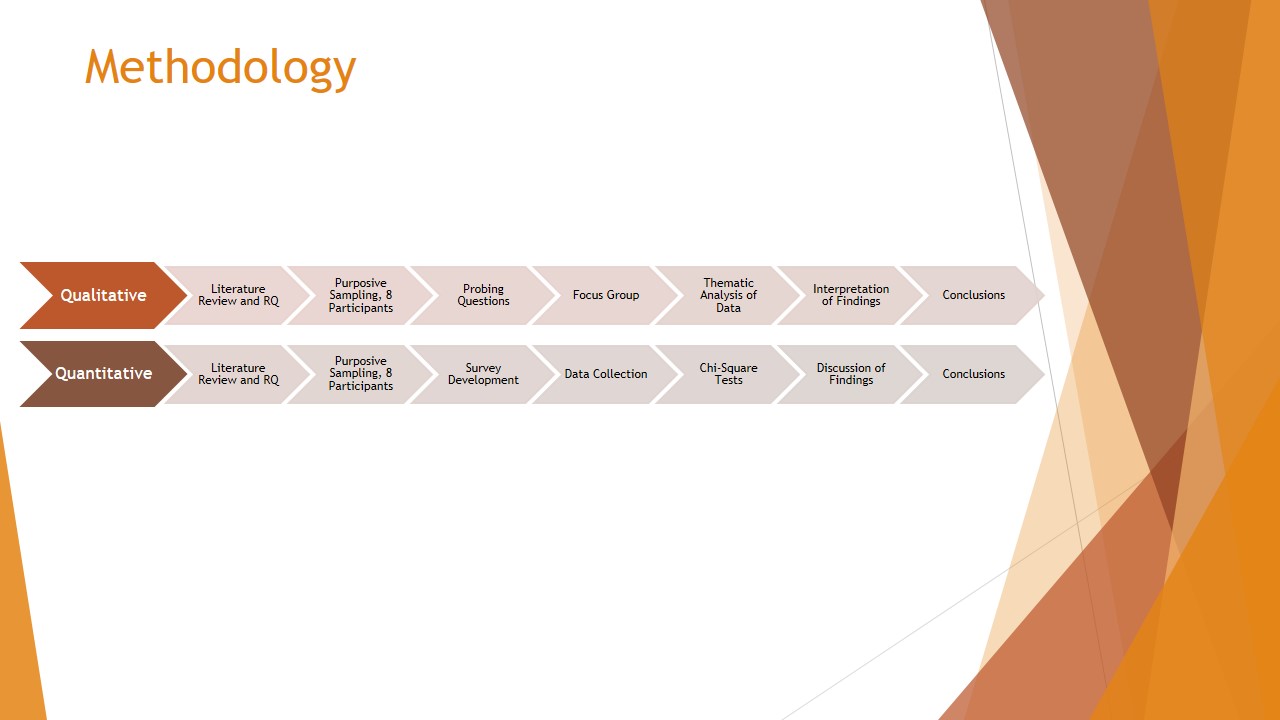
Literature Review
- Environmental awareness in operations management is a comparably new trend (Baki 2018; Gelhard & Von Delft 2016; Hitt, Xu & Carnes 2016).
- Managers face difficulties when changing operations management via integrating environmental issues (Tay et al. 2015; Wong, Wong & Boon-Itt 2015).
- Environmental operations management is not typical today despite the introduction of this principle more than a decade ago (Longoni & Cagliano 2015).
- The modern world requires companies to shift to environmentally friendly operations (Achillas et al. 2018; Khan, Hussain & Ajmal 2016).
- Challenges include managers’ attitudes, the lack of resources, inappropriate organisational structures, cost constraints, and others (Dhull & Narwal 2016; Gelhard & Von Delft 2016; Kannan & Latan 2016).
Recent studies on the problem of environmental issues in operations management have indicated several areas for research. Thus, environmental awareness in the context of operations management is a comparably new trend (Baki 2018; Gelhard & Von Delft 2016; Hitt, Xu & Carnes 2016), and managers face difficulties when changing operations management in terms of integrating environmental issues into it (Tay et al. 2015; Wong, Wong & Boon-Itt 2015). Thus, environmental operations management is not a typical practice today in spite of the introduction of this principle more than a decade ago (Longoni & Cagliano 2015). Still, the modern situation in the world requires companies to shift to environmentally friendly operations (Achillas et al. 2018; Khan, Hussain & Ajmal 2016). Challenges they face at this stage include managers’ attitudes, the lack of resources, inappropriate organisational structures, cost constraints, and others (Dhull & Narwal 2016; Gelhard & Von Delft 2016; Kannan & Latan 2016). However, the principles of environmental management integrated into operations management are essential to achieve the sustainable development.
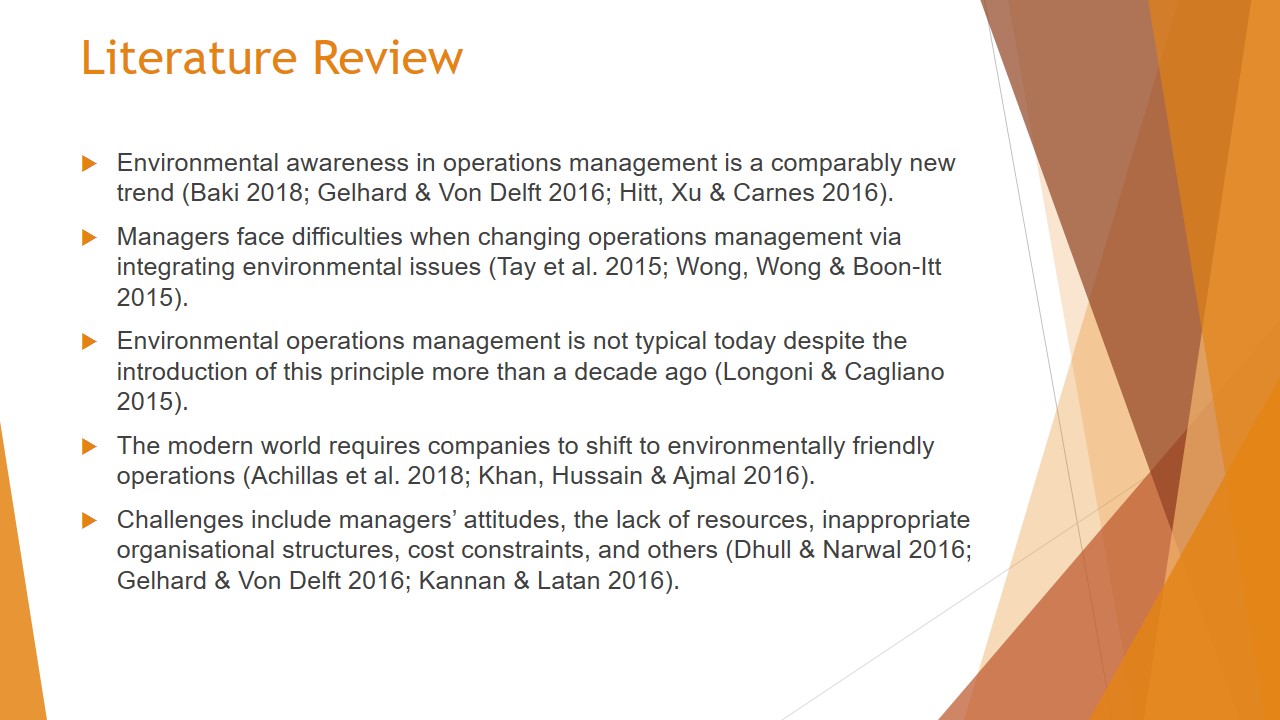
Limitations and/or Challenges
- Limitation 1: difficulties in finding participants having experience and knowledge related to the topic.
- 30 managers from different organisations to be contacted to select eight participants.
- Limitation 2: the nature of correlational research, the results indicate the relationship (not the cause and effect dependence) between variables.
- To address when discussing the findings.
- Challenges: the procedures of developing probing questions and surveys, the organisation of a focus group.
- To learn how to perform these research procedures.
The first limitation is associated with difficulties in finding participants having experience and knowledge related to the studied topic. To address this limitation, I will contact around 30 managers from different organisations to gain their consent to participate in the study and select eight participants. The second limitation is associated with the nature of correlational research, when the results indicate the relationship but not the cause and effect dependence of categorical variables on each other. This aspect will be taken into account when discussing the findings. The procedures of developing probing questions and surveys for the participants, as well as the organisation of a focus group, are also challenging, I need to learn how to perform these research procedures.
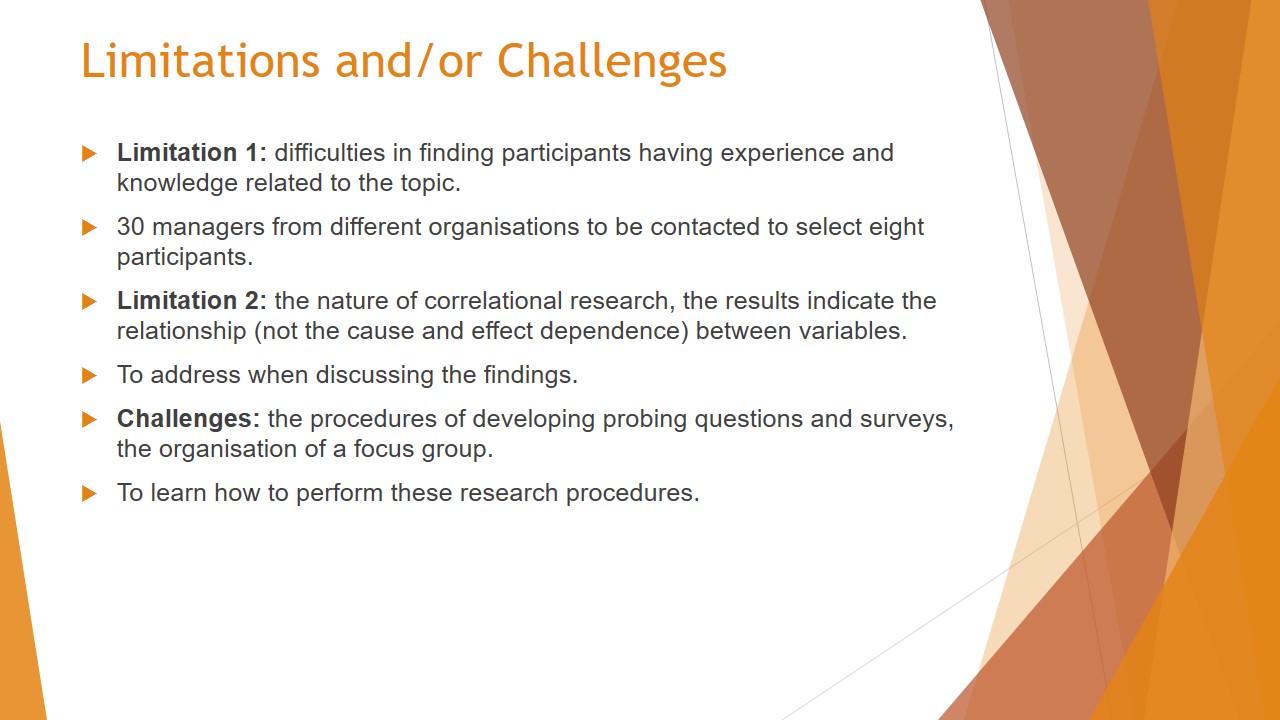
Reference List
Achillas, C, Bochtis, DD, Aidonis, D & Folinas, D 2018, Green supply chain management, Routledge, London.
Baki, R 2018, ‘Literature review on green supply chain management concept and problems during its implementation’, The Journal of International Scientific Researches, vol. 3, no. 2, pp. 114-122.
Choi, TM, Cheng, TCE & Zhao, X 2016, ‘Multi‐methodological research in operations management’, Production and Operations Management, vol. 25, no. 3, pp. 379-389.
Dhull, S & Narwal, M 2016, ‘Drivers and barriers in green supply chain management adaptation: a state-of-art review’, Uncertain Supply Chain Management, vol. 4, no. 1, pp. 61-76.
Gelhard, C & Von Delft, S 2016, ‘The role of organizational capabilities in achieving superior sustainability performance’, Journal of Business Research, vol. 69, no. 10, pp. 4632-4642.
Ghazilla, RAR, Sakundarini, N, Abdul-Rashid, SH, Ayub, NS, Olugu, EU & Musa, SN 2015, ‘Drivers and barriers analysis for green manufacturing practices in Malaysian SMEs: a preliminary findings’, Procedia Cirp, vol. 26, pp. 658-663.
Gustafsson, S, Hermelin, B & Smas, L 2019, ‘Integrating environmental sustainability into strategic spatial planning: the importance of management’, Journal of Environmental Planning and Management, vol. 62, no. 8, pp. 1321-1338.
Hitt, MA, Xu, K & Carnes, CM 2016, ‘Resource based theory in operations management research’, Journal of Operations Management, vol. 41, pp. 77-94.
Hooker, RE, Denslow, D & Giunipero, LC 2016, ‘Environmental sustainability in the supply chain: a review of past literature and discussion of potential drivers and barriers’, in M D’heur (ed), Sustainable value chain management, Routledge, London, pp. 51-66.
Jabbour, CJC, de Sousa Jabbour, ABL, Govindan, K, De Freitas, TP, Soubihia, DF, Kannan, D & Latan, H 2016, ‘Barriers to the adoption of green operational practices at Brazilian companies: effects on green and operational performance’, International Journal of Production Research, vol. 54, no. 10, pp. 3042-3058.
Karlsson, C (ed.) 2016, Research methods for operations management, 2nd edn, Routledge, London.
Khan, M, Hussain, M & Ajmal, MM (eds.) 2016, Green supply chain management for sustainable business practice, IGI Global, New York, NY.
Longoni, A & Cagliano, R 2015, ‘Environmental and social sustainability priorities: their integration in operations strategies’, International Journal of Operations & Production Management, vol. 35, no. 2, pp. 216-245.
Magon, RB, Thomé, AMT, Ferrer, ALC & Scavarda, LF 2018, ‘Sustainability and performance in operations management research’, Journal of Cleaner Production, vol. 190, pp. 104-117.
Panigrahi, SS & Rao, NS 2018, ‘A stakeholders’ perspective on barriers to adopt sustainable practices in MSME supply chain: issues and challenges in the textile sector’, Research Journal of Textile and Apparel, vol. 22, no. 1, pp. 59-76.
Tay, MY, Rahman, AA, Aziz, YA & Sidek, S 2015, ‘A review on drivers and barriers towards sustainable supply chain practices’, International Journal of Social Science and Humanity, vol. 5, no. 10, pp. 892-897.
Tseng, ML, Islam, MS, Karia, N, Fauzi, FA & Afrin, S 2019, ‘A literature review on green supply chain management: trends and future challenges’, Resources, Conservation and Recycling, vol. 141, pp. 145-162.
Ullah, M 2017, ‘Integrating environmental sustainability into human resource management: a comprehensive review on green human resource management’, Maghreb Review of Economic and Management, vol. 423, no. 4167, pp. 1-17.
Wong, CY, Wong, CW & Boon-Itt, S 2015, ‘Integrating environmental management into supply chains: a systematic literature review and theoretical framework’, International Journal of Physical Distribution & Logistics Management, vol. 45, no. 1/2, pp. 43-68.
Yang, F & Zhang, X 2017, ‘Analysis of the barriers in implementing environmental management system by interpretive structural modeling approach’, Management Research Review, vol. 40, no. 12, pp. 1316-1335.